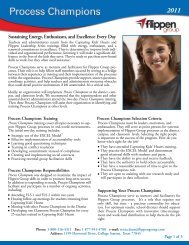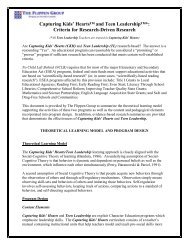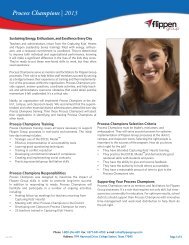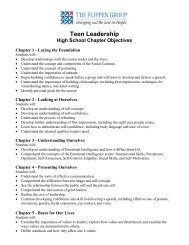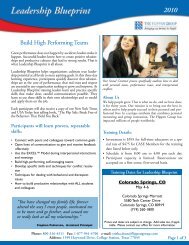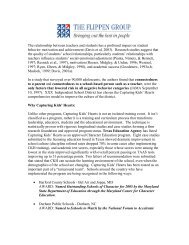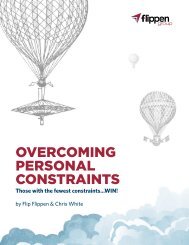Smart & Good High Schools - The Flippen Group
Smart & Good High Schools - The Flippen Group
Smart & Good High Schools - The Flippen Group
- No tags were found...
You also want an ePaper? Increase the reach of your titles
YUMPU automatically turns print PDFs into web optimized ePapers that Google loves.
CHAPTER 5: Fostering the 8 Strengths of Character—Outcome 2they write what they want our choir to look like when theyare a graduating senior. “What do you hope we’ll accomplishby the time you leave?”<strong>The</strong>n they seal that envelope and don’t open it until the endof their senior year. In the second envelope, they put theirpersonal goals for their freshman year. “What do you hopeto accomplish?” <strong>The</strong>y look at those goals at the end of theirfreshman year. For example, we have a state choral competition—alot of kids will say that they want to win GoldenState. That is a real motivation for them.“We ask freshman to set one goal forthe choir and one for themselves.”How do you view the role of competition?I believe competition can be healthy. We set it up in such away that no one feels they have to prove something. All thechoirs that compete are so good—they’re all there becausethey are into the music. It really is a wonderful thing.In the competitions we go to, all the groups are very supportiveof each other. I think a lot of that is because we seeeach other every year. And if you win, you can’t competethe next year, but you host the event in your hometown—which is a great honor. Over the years the competition hasbeen held in beautiful concert halls and public venues whereupwards of 3,000 people attend—which solidifies thepower of the experience for the kids.How do you help kids keep competition in perspective?I tell them that it’s an honor just to be invited. If you performthe music well, you bring honor to it regardless ofwhether you win. I say, “Sure they’re going to rate you, butduring the day when everybody is listening to you, not thatmany people are thinking about the points.”I tell them to take the opportunity to get to know theother students and the other choirs. Through the exposureto other amazing performers and performances, our kids arechallenged to better understand excellence.At the end of the evening, all the choirs sing a requiredpiece together. It is just phenomenal—a thousand kidsacross a huge auditorium joined together singing.When students are already achieving at high levels, how doyou keep them continuously striving to improve?Models of excellence. For example, I try to find other festivalswhere I know some group is going to be better thanus. This way our students always have something to aspireto, a standard by which to make themselves better.Recently, the choral leaders at an area college presentedtheir fall concert. I bought thirty tickets and gave them tostudents in our program that I thought would be interested.Later, in class, I asked for their feedback on the concert:“What did these other performers do that we should incorporateinto our performance?”“I ask, ‘What did these otherperformers do that weshould incorporate?’”My students offered all kinds of insights from what theysaw and admired. For example, one student focused on aparticular male singer and said, “When the women weresinging, he never stopped paying attention. You could see itin his eyes and in his face; he was fully engaged. It was notlike it was break time.” We talked about how that kind ofconcentration would help our rehearsals.What do you see as the long-term benefits of students’ participationin this kind of program?My goal is to have students approach music as a lifelongpassion. I tell them that my job as an educator is to makethem lifelong singers no matter what level they perform at.I say, “I don’t expect you all to go to college and be musicmajors. But I would hope that you would always have alove of singing and would always want to do it—whetherit’s in community theater, church choir, community choir,whatever.”OUTCOME 2:Diligent and Capable PerformerPromising Practice 7:2Develop perseverance through ahigh-challenge rite of passage.“<strong>The</strong>y do something they never thought theycould do.”“<strong>The</strong>y move out of freshman year when they cross thatDelaware Water Gap Bridge. Many of them cry.”<strong>The</strong> speakers are faculty at an inner-city Catholic boys’high school. For more than 25 years, the school hasserved mostly Black and Hispanic students from lowincomefamilies. Nearly all of the school’s graduates go tocollege; many become successful entrepreneurs, andmany others enter the professions.<strong>The</strong> faculty are talking about one of the school’s defining114<strong>Smart</strong> & <strong>Good</strong> <strong>High</strong> <strong>Schools</strong>



